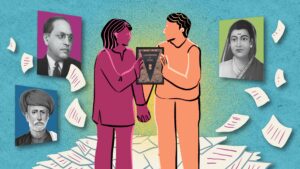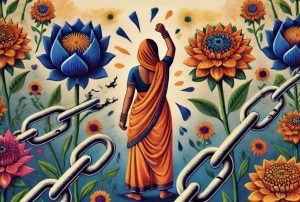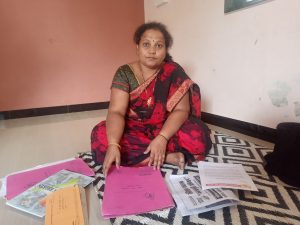Women From The Bedia Community In Morena (MP) Suffer Disproportionately As Their Work Halts

Rohini Charri, founder of community organistation Bhumi Gramutthan evam Sehbhagi Gramin Vikas Samiti, that works with women of the Bedia community
The duration of lockdown has proven difficult for everyone, but it has been more challenging for those who belong to the marginalized sections of the society, particularly those dependent on daily wages for their survival. Such marginalised communities, amongst others, include – Nat, Bedia, Banchhada, Sansi, Kanjar, Kalbeliya, Sapera and other such communities whose families depend on their ability to earn each day. These are from the Denotified, nomadic and semi-nomadic tribes faced historical injustices in both colonial as well as free India. They were classified as ‘criminal’ by the state as per the colonial Criminal Tribes Act, 1871, stigmatising their lives and professions. There are about 500 Denotified, Nomadic and semi-Nomadic tribes as per the Renke Report( 2008). The socio-economic conditions are poor for these communities- 66% have no savings and 43% people are in debt from private money lenders. Women are even worse off with 62% of them never enrolled in school, according to the Idate Commission report.
I will talk about one such community, the Bedia Community in Morena, Madhya Pradesh, whose women depend on sex work. Most families in this community are dependent on the income of women in their families for their survival.
As their work came to a complete standstill due to the lockdown imposed since March 24 2020, the condition of Bedia women has worsened. As primary earners and caregivers, the main impact of the inability to access goods is borne by women. A large number of women are facing both physical as well as mental abuse at this time. Many Bedia women who work in bars or as sex workers in metropolitan cities are extremely vulnerable to getting infected with Covid-19.
Since the lockdown, I have been speaking to many of these women from my community who are in Mumbai and Delhi to understand their situation. They find themselves between a rock and a hard place.
They are unable to survive in big cities with no savings left and threats of eviction. They are finding it difficult to even manage three meals in a day. On the other hand, they are unable to come back to their hometown. Even if they are able to come back, the question is, what will they do? Due to the stigma associated with their work, who will give them any jobs? Even the men from this community have been unable to get proper jobs because of the stigma attached to the work that the women do. Yet, all those who say that sex work should be stopped do not come forward to help them with any other form of employment.
The Bedia community’s history and culture is being erased by the government. It keeps passing acts that slowly diminish facets of our lives and the lives of many Denotified and Nomadic Tribes. These communities have been trying to preserve their traditions (be it their relationship with animals like bears, snakes, or their performances and entertainment work). There is a dichotomy when upper caste practices of classical performing arts are feted while our practices are looked down upon.
While celebrities in entertainment gain popularity, our entertainment practices are criminalised. I want to ask people who live in cities – do you promote your culture only in your 9 to 5 life? Communities like ours have been finding it difficult to survive, since we have no other means to earn a living.
Government relief schemes are inaccessible to them. Many do not have Jan Dhan accounts or are not registered in the Ujjwala scheme for free LPG cylinders. For those who have Jan Dhan and can access them, is Rs 500 sufficient to help a family survive?
This situation is already forcing women to borrow at a higher rate of interest and there is a danger of being trapped in long term indebtedness.
During my interactions, the women also shared that they were waiting for the lockdown to end so that they could work. From what I understand, after the lockdown ends these women will put their health at stake to fend for their families. They will be highly exposed to Covid-19 as well as HIV/AIDS. Adolescent girls from this community, many of whom drop out of school at an early stage, will be in an extremely vulnerable position. Many of these young girls will be forced to join sex work in order to help payback the hefty loans. After all “the value of education is less when compared to hunger”.
How far has the government thought for the women belonging to the Bedia or other denotified tribes? What about their children and their education? My question to all is to question those who talk about “reforming” this community: Where are you now?
[Rohini Chhari is from the Bedia community and the founder of Bhumi Gramutthan Evam Sehbhagi Gramin Vikas Samiti, a community based organisation that works with Bedia women involved in sex work and their rights and entitlements]
We believe everyone deserves equal access to accurate news. Support from our readers enables us to keep our journalism open and free for everyone, all over the world.




